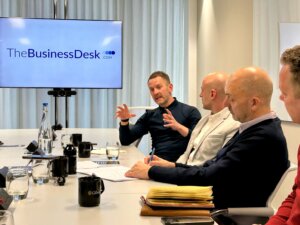In ‘Neurodiversity and inclusion’, Chris Finnegan, change specialist at Curium Solutions, writes about neurodiversity and creating a workplace and culture that includes diversity in all its forms.
When we think of diversity in the workplace, the things that usually come to mind are gender, ethnic origin, age, disabilities etc. However, companies are starting to wake up to the idea that diversity is much more than physical attributes, and that diversity of thought and behaviours are just as important in creating a truly diverse workforce.
Neurodiversity is a new concept of diversity. It considers neurological conditions such as autism and dyslexia as natural human variations, rather than as things that need to be cured. It believes that neurological conditions are an authentic form of human diversity, similar to other widely accepted forms of diversity, such as gender and ethnicity.
The core concept is that individuals who are ‘non-neurotypical’ should not be forced to adapt and conform to societal ideals but, instead, should be allowed to live their lives as they are. By doing this, they could take advantage of their differences, rather than seeing them as weaknesses.
Neurodiversity in the workplace
There are many neurological conditions such as autism and dyslexia, which are sadly often associated with stigmas, and are then under-represented and under-utilised in the workforce.
However, there are many benefits to having a neurodiverse workforce, and there are many things that employers can do to help people and release their potential. These include:
- Awareness – providing employees with information about neurological conditions can help raise awareness and create an environment in which people are more understanding and accepting of different behaviours. Additionally, those with neurological conditions may also not know how their behaviour is perceived by others, so increasing awareness on both sides adds real value.
- Recruitment – rigid recruitment processes that allow little flexibility can often disadvantage those with neurological conditions, as it provides little room for them to demonstrate skills in ways that work for them. Adopting a more flexible approach and giving candidates multiple options to showcase what they can do can really help open doors for these individuals.
- Tailoring – where possible, tailoring an employee’s role to tap into natural skills and talents can be a way to get the best out of them, but especially those with neurological variations who may struggle with some tasks but really excel at others.
- Communication – it is important to be open and honest with feedback related to behaviours and performance, addressing any issues head on. It’s vital to also focus on the strengths as well as the development points.
These are just a few small steps that any organisation can take towards becoming a more inclusive and diverse workplace.
Those organisations who have already embraced neurodiversity have reported a wide range of benefits. These include enhanced innovation, the ability to view things from different perspectives, trying out new approaches, and developing highly specialised skills in focused areas which, in turn, makes it easier to govern and control complex processes.
Ready to take steps towards a more diverse and inclusive workforce?
For anyone interested in understanding how diversity of thought and behaviours plays out in their own teams or organisation, a simple way to do this is to use the behavioural preference tool TetraMap®.
TetraMap is a learning model which accelerates an understanding of self and others, focusing on what influences our behaviours, and how we can flex to achieve our desired outcomes.
At the heart of TetraMap is this belief: strength lies in valuing differences. The Elements TetraMap uses are rooted in nature and are: Earth, Air, Water and Fire. Every Element has a part to play and every individual has all four Elements.
TetraMap preferences provided the basis for our latest report: Empowering inclusive leaders for a diverse world. Take a look and see how knowing more about your own preferences and those of others can help you to create a more inclusive workplace.
Get in touch if you want to find out more about TetraMap, and how this can add value to any team.


